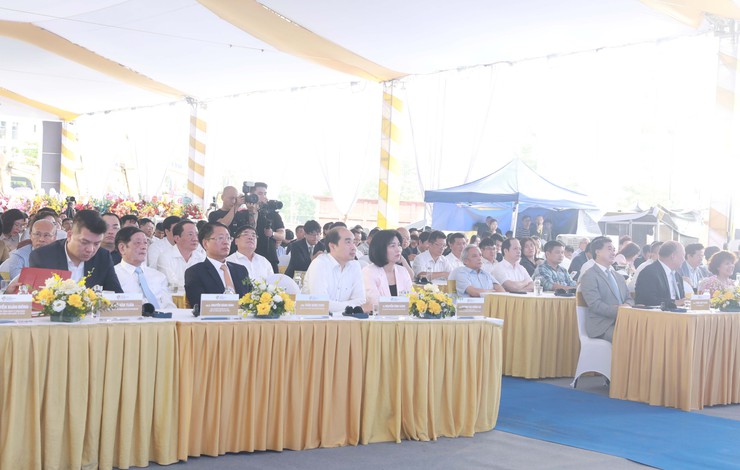Nguyen Xuan Dong, General Director of VINACONEX and Chairman of the Board of AEGIS International Hospital, said the project has a total investment of VND4,500 billion (US$177.5 million) with a floor area of 287,000 square meters.

Overview of the ceremony.
Designed by Japan's RW Company, the hospital will include two 26-story towers, four basement levels, and an eight-story multifunctional building, providing 1,000 beds. It is envisioned as one of the largest private medical complexes in Vietnam.
With the goal of earning JCI accreditation, the world's most rigorous standard for patient safety and quality, the hospital is being developed as a smart hospital.
It will include specialized centers in precision oncology, cardiology and respiratory care, musculoskeletal and rehabilitation, obstetrics, gynecology, pediatrics, IVF, aesthetic orthopedics, regenerative medicine, imaging diagnostics, and molecular biology testing.
This marks the beginning of a strategy to build a chain of international-standard AEGIS hospitals in provinces and cities nationwide.

Delegates at the event.
With an open cooperation policy, AEGIS International Hospital will bring together leading domestic and international experts and nurture breakthrough ideas that contribute to the advancement of Vietnam's healthcare system.
Deputy Minister of Health Tran Van Thuan affirmed that the groundbreaking of AEGIS International Hospital is a vivid example of the Party and State's policy to encourage healthcare socialization, strengthen public–private partnerships, and develop high-quality private hospitals.
He said the project is also a concrete step in implementing Resolution 57-NQ/TW on science, technology, innovation, and digital transformation, Resolution 68-NQ/TW on private sector development, and especially Resolution 72-NQ/TW of the Politburo on breakthrough solutions to protect and improve public health.
He emphasized that the hospital's patient-centered approach, with personalized and compassionate care, reflects ongoing efforts to provide Vietnamese citizens with safe, effective, and internationally comparable healthcare services at home.
The Ministry of Health, he added, will continue to support strategic investors by improving regulations, streamlining administrative procedures, and ensuring transparent licensing and accreditation, so that visionary, human-centered healthcare projects can be implemented on schedule, operate effectively, and bring positive impacts to the national system.
As part of the event, AEGIS International Hospital signed cooperation agreements on research, technical support, training, and technology transfer with leading medical universities (Hanoi Medical University, Hai Phong University of Medicine and Pharmacy, Thai Nguyen University of Medicine and Pharmacy), top-tier central hospitals (Bach Mai Hospital, Viet Duc Friendship Hospital, and Saint Paul Hospital), research institutes, and international organizations, with a special focus on Japanese partners.